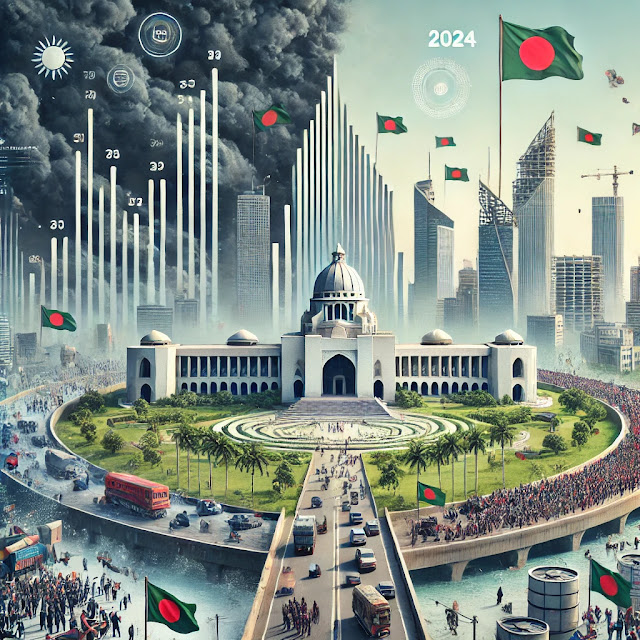The Political Situation in Bangladesh from 2006 to 2024
Bangladesh, a South Asian country with a rich cultural and historical heritage, has experienced significant political developments between 2006 and 2024. This period has been marked by political upheavals, power struggles, and reforms that have shaped the country's socio-economic landscape. This article delves into the political situation in Bangladesh over these years, highlighting key events, their impacts, and the broader implications for the nation’s democracy and governance.
The Caretaker Government Era (2006–2008)
The political scene in Bangladesh reached a critical juncture in late 2006. The country was embroiled in disputes over election preparations, with opposition parties accusing the then-government of manipulating electoral processes. This led to widespread unrest and the inability of the interim government to maintain order.
In January 2007, the military intervened, backing a caretaker government led by Fakhruddin Ahmed. The administration focused on stabilizing the country and curbing corruption. High-profile arrests included politicians from both the Bangladesh Awami League (AL) and the Bangladesh Nationalist Party (BNP). During this period, significant reforms were introduced, including efforts to update the voter list and strengthen the Election Commission.
The caretaker government also delayed elections to ensure a fair process, eventually holding the polls in December 2008. This transitional period saw a mix of successes and criticisms, particularly over the prolonged suspension of democracy.
The Return of Democracy: Awami League’s Dominance (2009–2014)
In the 2008 general elections, the Awami League, led by Sheikh Hasina, won a landslide victory, securing over two-thirds of parliamentary seats. This marked the beginning of a period of political stability under AL’s governance.
Sheikh Hasina's administration focused on infrastructure development, poverty reduction, and economic growth. Notable projects like the Padma Bridge and digital initiatives under the “Digital Bangladesh” agenda took center stage. However, opposition voices, especially from the BNP, criticized the government for alleged authoritarian tendencies and a lack of inclusivity in decision-making.
One of the most contentious issues during this period was the abolition of the caretaker government system through the 15th Amendment to the Constitution in 2011. The BNP and other opposition groups viewed this as a move to consolidate power, leading to widespread protests and boycotts of subsequent elections.
2014 Elections and Political Crisis
The 2014 general elections were marred by controversy. The BNP-led opposition coalition boycotted the polls, citing concerns over fairness due to the absence of a neutral caretaker government. Consequently, over half of the parliamentary seats were uncontested, allowing the Awami League to retain power.
The boycott led to a political vacuum and violent clashes between government supporters and opposition activists. Nationwide strikes and blockades disrupted daily life, and allegations of human rights abuses by security forces drew criticism from international organizations.
Despite these challenges, the Awami League pressed ahead with its development agenda. The government maintained a strong grip on power but faced growing discontent among segments of the population.
The 2018 Elections and Consolidation of Power
The 2018 elections saw another landslide victory for the Awami League. However, the electoral process was criticized both domestically and internationally. Reports of vote rigging, intimidation, and suppression of dissent tarnished the credibility of the polls.
By this time, Sheikh Hasina's government had implemented significant infrastructure projects, such as the metro rail in Dhaka and large-scale power plants, which boosted economic growth. Yet, concerns about press freedom, judicial independence, and political persecution persisted. The BNP, weakened by internal divisions and leadership challenges, struggled to mount an effective opposition.
Political Landscape from 2019 to 2024
The years leading to 2024 have been characterized by political continuity under the Awami League. The government has emphasized technological advancements, economic growth, and social reforms. However, challenges such as corruption, rising inequality, and environmental issues have persisted.
Opposition parties, including the BNP, have continued to call for reforms and free elections but have faced restrictions and suppression. Civil society organizations and media outlets have also faced increasing pressure, raising concerns about the state of democracy in Bangladesh.
The government has prioritized international relations, particularly with India and China, to bolster trade and infrastructure investments. However, balancing these partnerships while maintaining sovereignty remains a delicate act.
Key Themes in Bangladesh’s Political Landscape (2006–2024)
1. Electoral Controversies and Democratic Challenges
Elections during this period have often been contentious, with questions raised about their fairness and inclusivity. The abolition of the caretaker government system has been a pivotal issue, shaping opposition strategies and public perceptions of governance.
2. Economic Growth Amidst Political Unrest
Despite political instability, Bangladesh has achieved impressive economic growth. From being classified as a low-income country, it has transitioned to a middle-income economy, driven by its robust garment sector, remittances, and infrastructure investments.
3. Suppression of Dissent
Critics argue that the government has increasingly suppressed dissent, targeting opposition leaders, journalists, and activists. Allegations of extrajudicial killings, enforced disappearances, and curbs on press freedom have marred the country's human rights record.
4. Regional and Global Dynamics
Bangladesh has strengthened ties with regional powers, navigating complex geopolitical challenges. Its strategic location makes it an important player in South Asia, particularly in trade and security discussions.
Conclusion
The political situation in Bangladesh from 2006 to 2024 reflects a complex interplay of democratic aspirations, economic ambitions, and governance challenges. While the country has made significant strides in development, the erosion of democratic norms and political inclusivity raises concerns about its long-term stability.
Moving forward, fostering a culture of dialogue and transparency will be essential for Bangladesh to navigate its political challenges and ensure sustainable progress. The upcoming elections and political reforms will be critical in shaping the nation's democratic future...








%20displaying%20PPC%20ads%20on%20screens.%20The%20scene%20should%20be%20visual.webp)
